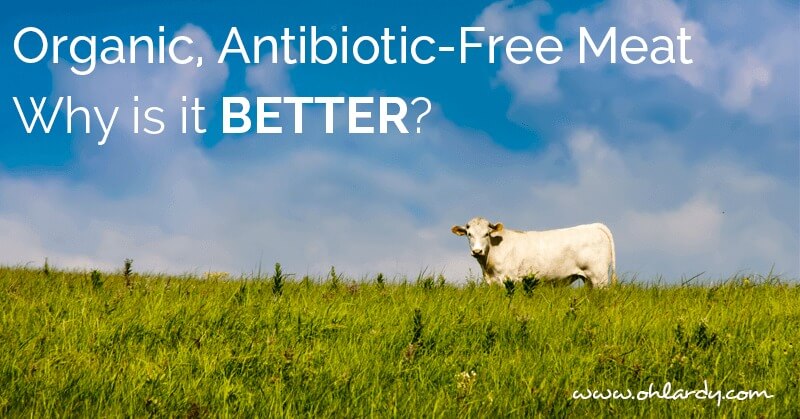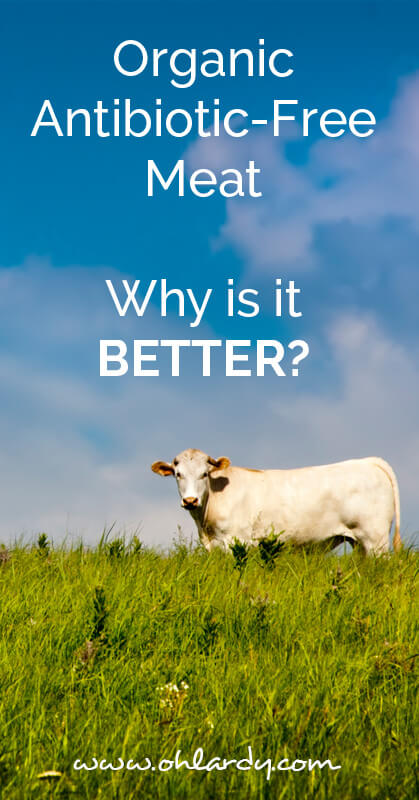Organic, Antibiotic-free Meat: Why is it Better?
Oh Lardy! is a participant in the Amazon Services LLC Associates Program, an affiliate advertising program designed to provide a means for us to earn fees by linking to Amazon.com and affiliated sites.

By Leslie Vandever
If you like meat, you’ll probably agree that there’s hardly anything tastier than a thick, savory hamburger fresh off the grill with all the fixings. But what if that hamburger is instrumental in making you sick?
Like most of the other meats available for sale in your local grocery stores, hamburger and other cuts of beef are from cattle that live their short lives—from birth to butcher—in close quarters with their herd-mates. To keep bacterial infections that might sicken, slow their growth or even kill an animal, and to keep those infections from spreading throughout the herd, ranchers dose them periodically with powerful antibiotics—many of them the same ones that doctors prescribe to humans.
The residue from the antibiotics remain in the muscles and organs of the animals for the rest of their lives. They remain in the meat that we buy from the grocery store. Animals also excrete the antibiotics as waste. Eventually, they end up in the soil we grow our crops in and in the water we drink.
Antibiotics are absolutely amazing drugs. Over the last several decades they’ve saved millions from dying from bacterial infections of all kinds. But over the couple of decades it’s become increasingly clear that because of antibiotic overuse, some sickness-causing bacteria, such as staph and salmonella, are becoming—or have become—resistant to them.
We overuse antibiotics when doctors prescribe them for illnesses they can have no effect on, like the viruses that cause the common cold or flu. When we eat beef, chicken, eggs, and pork treated with antibiotics, too, we’ve set up a situation in which bacteria (which reproduces and evolves rapidly) can become resistant or immune to some antibiotics.
MRSA (Methicillin-resistant Staphylococcus aureus) is a headline-making, antibiotic-resistant bug that’s become tragically common in hospitals and, increasingly, in other public spaces, responsible for sickening 2 million Americans and killing about 23,000 every year. MRSA can be knocked out by a very few, extremely powerful antibiotics, but only if it’s caught early, before it’s had a chance to spread throughout the body.
If our miracle medicines can’t kill those resistant bugs, chances are much higher that they’ll kill us.
The U.S. Department of Agriculture (USDA) holds ranchers and farmers who produce organic meats to strict standards. Organic farmers and ranchers don’t use antibiotics or chemical pesticides on their animals. In addition, they raise their herds and flocks in more spacious surroundings, eliminating the crowding and stress that makes the rapid passing of bacterial infection from animal to animal more likely. These animals also produce fewer stress hormones, which remain in their tissues after butchering and may cause adverse effects in humans. And, organic farmers and ranchers don’t use growth hormones or other chemicals on their herds.
Finally, buying organic meats supports more ecologically sustainable animal husbandry, farming, and ranching practices. You can continue to enjoy that delicious organic hamburger, knowing you’ve done what you could to help yourself and others stay healthy while helping the animals that feed you live happier lives.
Leslie Vandever is a professional journalist and freelance writer with more than 25 years of experience. She lives in Northern California.
References:
- Are Organic Foods Right For You? (n.d.) org. Retrieved on November 13, 2014 from http://www.helpguide.org/articles/healthy-eating/organic-foods.htm
- Organic? What’s the Big Deal? (n.d.) Greening Princeton. Retrieved on November 13, 2014 from http://www.princeton.edu/greening/organic4.htm
- National Organic Program. (2014, May 30) S. Department of Agriculture. Retrieved on November 13, 2014 from http://www.ams.usda.gov/AMSv1.0/nop
- Antibiotic/Antimicrobial Resistance: Threat Report 2013: MRSA. (2014, June 2) Centers for Disease Control and Prevention. Retrieved on November 13, 2014 from http://www.cdc.gov/drugresistance/threat-report-2013/

